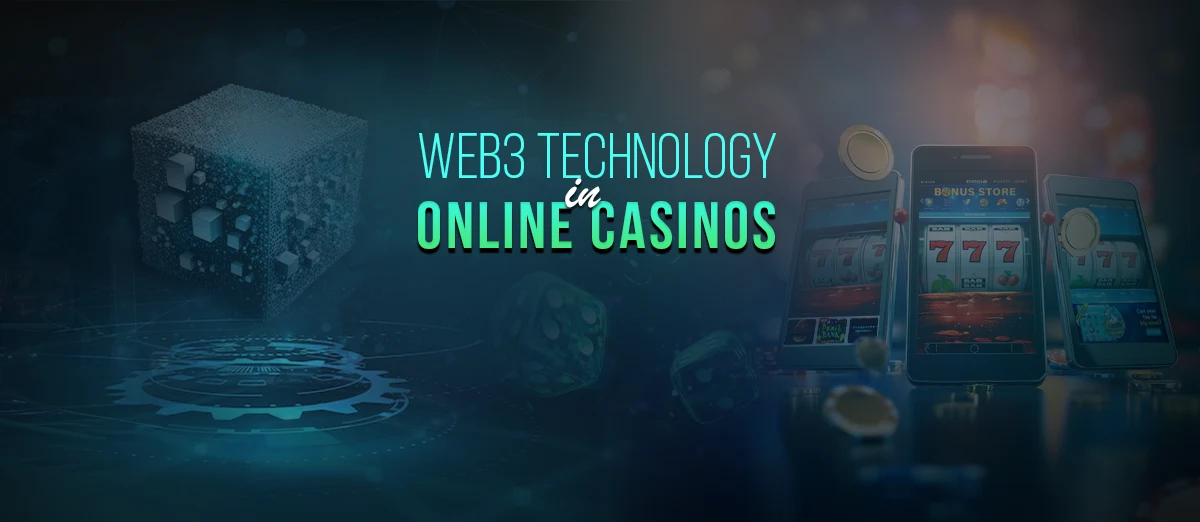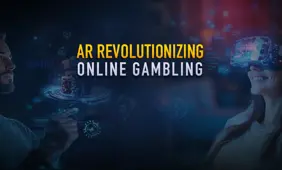Web3 Technology's Revolutionary Influence on the Online Casino Industry

The online gambling industry has witnessed significant change over the last couple of decades, with specific emphasis being committed to special elements of development during particular phases. As a result, these have often provided unprecedented convenience and accessibility. However, the digital nature of these platforms has also brought into question significant concerns about fairness, security, and transparency.
As a result, one of the most promising solutions in recent times to this challenge has emerged, through something called Web3 technology. This works by leveraging decentralized finance (DeFi), smart contracts, crypto and blockchain in gambling. The idea behind this is to implement Web3 into online casinos and create a more transparent, secure, and trustworthy environment for their customers overall customer experience.
Web3 refers to the next generation of the internet, which can be applied to multiple industries and verticals, where decentralized technologies and blockchain form the backbone of digital interactions. Unlike Web2, which is characterized by centralized servers and data silos, Web3 aims to create a more open and decentralized. Major components of Web3 technology include:
- Blockchain: A distributed ledger that records transactions across a network of computers. Blockchain ensures transparency and immutability, meaning it cannot be altered once data is recorded.
- Smart Contracts: Self-executing contracts with the terms of the agreement directly written into code. Smart contracts automatically enforce and verify the contract's performance, reducing the need for intermediaries.
- Decentralized Finance: A financial system built on blockchain technology that operates without traditional banks or financial institutions. DeFi offers various financial services, including lending, borrowing, and trading.
- Cryptocurrencies: Digital or virtual currencies that use cryptography for security. Cryptocurrencies operate independently of central banks and are often used as a medium of exchange within the Web3 ecosystem.
Will Web3 Technology Transform the Online Casino Experience?
One fundamental way Web3 can build trust at online casinos is through enhanced transparency. Traditional online and live casinos often operate as black boxes, where customers have little visibility into the fairness of games or the handling of their funds. Web3 can change this by providing an open and verifiable system.
In addition, ‘provably fair gaming’ is another concept that is enabled by blockchain technology, where customers can independently verify the fairness of each game outcome. As such, in a casino that utilizes Web3 technology, it means the algorithms which generate random numbers and determine game results are recorded on the blockchain. Furthermore, customers are then able to access these records and use cryptographic techniques to verify that the outcomes were not tampered with.
This level of transparency is unprecedented in traditional online casinos and significantly enhances customer trust. Players can be confident that the games are fair and that the casino is not manipulating the Random Number Generator (RNG).
Transparent Transactions
Blockchain technology ensures that all financial transactions are recorded on a public ledger. As such, deposits, withdrawals, and bets can be transparently tracked and verified by anyone. customers no longer have to rely on the casino’s internal records or trust that their funds are handled appropriately. Instead, they can independently verify every transaction, which builds a higher level of trust.
Decentralized Storage
Traditional online casinos typically store customer data and funds on centralized servers, making them attractive cyberattack targets. In contrast, Web3 casinos can use decentralized storage solutions, such as the InterPlanetary File System (IPFS), to distribute data across a network of nodes. As such, it makes it significantly harder for hackers to compromise the system, as there is no single point of failure.
Smart Contract Security
The idea behind а Smart Contract security is that they are able to automate the execution of agreements and ensure precise coding. This reduces the risk of human error or manipulation. Smart Contracts are highly effective, because they are able to manage online casinos' deposits, payouts, and game logic. Since these contracts are transparent and immutable, customers can trust that the rules are followed without intermediaries. Additionally, smart contracts can undergo rigorous security audits by third-party experts to identify and fix vulnerabilities, which can further enhance the system security and trustworthiness.
Zero-Knowledge Proofs
Zero-knowledge proofs (ZKPs) are cryptographic techniques that allow one party to prove to another that a statement is true without revealing any additional information. In online casinos, ZKPs can be utilized in order to help verify the legitimacy of a customer’s bet or the fairness of a game outcome. Also, this works without revealing any sensitive information. In addition, this process helps to protect customer privacy as well as maintaining transparency and trust - this is something that is taken very seriously in the gambling industry.
Prior to this, big operators would invest a significant amount into Business Intelligence (BI) in order to try and assist with this. Due to ZKPs still being in their relative infancy in the gambling industry, BI departments still exist and continue to play an important role.
Decentralized Identity Solutions
Decentralized identity (DID) solutions enable customers to control their personal information and share it selectively. Instead of providing sensitive data to the casino, customers can prove their identity through a decentralized system that verifies their credentials without revealing unnecessary details. This reduces the risk of data breaches and enhances customer privacy as a result.
Financial Integration and Accessibility
Web3 technology can also promote financial integration and accessibility in online casinos. Traditional economic systems often exclude individuals who lack access to banking services or who live in regions with strict financial regulations. Furthermore, some customers often quickly become disillusioned by some of the drawbacks that traditional casino payment methods have, such as long processing times for withdrawals. Cryptocurrencies and DeFi can address these challenges by providing a more inclusive and accessible financial ecosystem.
Cryptocurrency Payments
Cryptocurrencies offer a borderless and decentralized payment method that anyone with an internet connection can use. Already, some online casinos have started to offer customers the ability to deposit using a cryptocurrency of their choice, while there are even crypto-only online casinos. By accepting cryptocurrencies, it means that online casinos can acquire a much bigger audience - even new customers, while providing an alternative to traditional banking systems. This not only enhances accessibility but also builds trust among customers who prefer to use digital currencies.
DeFi Integration
Integrating DeFi services into online casinos can provide customers with additional financial options, such as earning interest on their deposits, taking out loans, or participating in decentralized deposit pools. These services operate transparently on the blockchain and can offer more favorable terms compared to traditional financial institutions. By leveraging DeFi, online casinos can create a more attractive and trustworthy ecosystem for their customers.
Regulatory Compliance and Self-Governance
Regulatory compliance is a significant factor in building trust, as it ensures that online casinos operate within the legal framework and adhere to industry standards. Web3 can boost gambling compliance and even enable self-governance models that enhance trust. It could also mean that there may well be less governance from gambling commissions, from a responsible gambling standpoint here, especially if Web3 technology proves effective enough to render hands-on governance, at least partially redundant.
Automated Compliance with Smart Contracts
Smart contracts can be programmed to automatically enforce regulatory requirements, such as KYC (Know Your Customer) and AML (Anti-Money Laundering) checks. By automating these processes, online casinos can ensure compliance with minimal human intervention, reducing the risk of errors or fraud. This would build trust among regulators and customers, demonstrating a commitment to operating within the law.
Decentralized Autonomous Organizations (DAOs) are governance structures that operate on the blockchain, where decisions are made collectively by token holders. Online casinos can adopt a DAO model to enable customers to participate in decision-making processes like development, fee structures, and community guidelines. The idea here is to help make the platform fairer, while building trust by giving customers a voice in how the casino is run.
Complexities of Web3 Technology in Online Casinos
While Web3 technology holds immense potential for building trust in online casinos, it also presents several challenges that must be addressed. Implementing Web3 solutions requires a high level of technical expertise. Online casinos must invest in skilled developers and security experts to build and maintain a robust and secure system. Additionally, customers may need to familiarize themselves with new technologies, which could hinder adoption.
Meanwhile, the regulatory landscape for Web3 and cryptocurrencies are still continuing to evolve and will likely stay on this path for quite some time. As a result, online casinos will need to get to grips with this uncertainty and ensure compliance with existing and emerging regulations. This, ultimately, is likely to require a proactive approach and particular cooperation with regulators, in order to form some sort of a legal infrastructure that can complement innovation while balancing the act of protecting customers.
Although secure and transparent, blockchain technology could encounter scalability and performance issues, exorbitant transaction fees and slow processing times can have an effect on the customer experience - as many have seen over the years. As such, it is up to online casinos to carefully consider solutions such as layer-2 scaling and alternative blockchain networks as a way of coming up with a solution that makes sense.
A New Era of Trust and Security
Ultimately, Web3 technology offers a transformative approach to building trust in online casinos. Gambling sites can create a more transparent, secure, and customer-centric environment by leveraging blockchain, smart contracts, decentralized finance, and privacy-enhancing technologies. As a result, it would address, some, if not all of the critical concerns surrounding fairness, security, and privacy, while promoting financial inclusion as well as regulatory compliance.
As the ecosystem evolves, online casinos can adopt Web3 innovations and set new standards for trust and transparency in the digital age. Should the industry fully embrace Web3 technology, it would mean that online casinos, based on what all of the infrastructure promises, can build a more trustworthy and resilient platform that benefits customers, operators, and the broader gambling industry.





Review this Blog
Leave a Comment
User Comments
comments for Web3 Technology's Revolutionary Influence on the Online Casino Industry